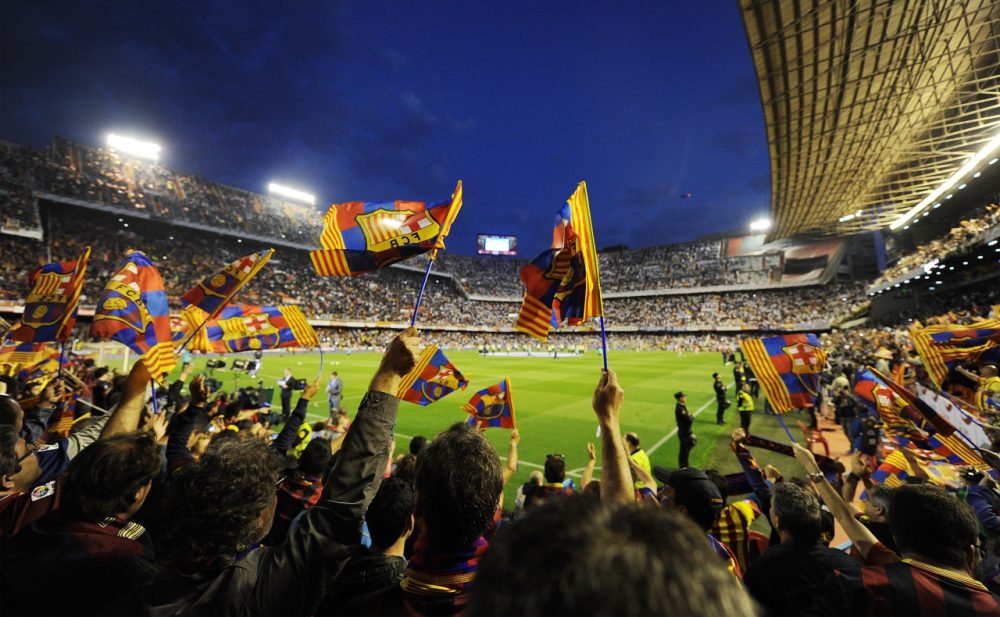Advertisement
Inequality, Debt Hold Spanish Soccer Back
Resume
Last season, the Spanish soccer team Real Murcia finished in fourth place in Spain’s second division, just missing promotion and a chance to play against Barcelona and Real Madrid in the top tier. But after a complicated legal tussle, this week the league announced it would drop Murcia into Spanish soccer’s third division.
Why? Because Spanish soccer has been a financial mess for years, and Spain’s soccer authority is finally forcing teams in the top two leagues to pay down their debt — or get out.
'This League Makes Us Sick'
While the president of Spain’s professional soccer organization was announcing that Real Murcia would be relegated for not meeting its financial obligations, 300 Murcia fans gathered outside league headquarters in Madrid and chanted, “This league makes us sick.”
League president Javier Tebas wasn’t moved. Time had come to crack down on Spanish soccer’s economic scofflaws.
“Real Murcia wasn’t allowed into the second division because it didn’t comply with the economic ratios,” he said.
Of course, Murcia fans didn’t feel the same way. After all, last season they’d almost made it into La Liga, Spain’s top tier, and now they were going to be thrown into the netherworld of the third division.
“What did I think? Anger and impotence mostly, but also desperation,” said Francisco Javier Carrión, a Real Murcia fanatic who writes for the fan site MurciaMania.com.
Still, Carrión understands.
“It’s unjust for the fans, but for the team as a business it’s not because, unlike other teams, it hasn’t complied economically,” he said.
TV Money Spurs Inequality
Murcia’s crime was that it had some €35 million in debts, including €13 million it owed in back taxes. That meant that its ratio of debt to income was higher than the new league limit of 4.5-to-1.
But Real Murcia is not alone. The league put the new limits into place because Spanish soccer has been a financial disaster for years.
“In 1995, the clubs in the top two divisions had €500 million in debt,” said Plácido Rodríguez, president of the International Association of Sports Economists and former president of the Sporting de Gijon soccer team. “Now they owe about €3 billion, including €500 million in back taxes.”
Rodriguéz says that Spanish soccer is suffering from an inequity that began after TV money flooded the top league in the 1990s. The problem is that the TV pie wasn’t split equally. Today, Real Madrid and Barcelona get almost €200 million a year, while smaller teams only get about €20 million.
Desperate to avoid relegation, smaller La Liga teams took to competing with Barcelona and Real Madrid for players they couldn’t afford. And then they sunk under their bloated payrolls.
That’s what happened to Real Murcia the last time it played in the top league, in the 2007-08 season.
“That season, the president signed players for huge salaries,” Carrión explained. “The season was a disaster, and the team never figured out how to overcome the debt.”
Can Spanish Soccer Be Fixed?
According to Ródriguez, more than half of the teams in the top two divisions have been in bankruptcy in recent years. Murcia itself went into bankruptcy in 2009.
So can Spanish soccer be fixed?
While Murcia fans protested outside, Tebas talked tough about enforcing the new financial rules.
“We’re happy to have 100 protests like the one today if it means we can continue to have the economic rigor the league has started and must continue,” he said.
Rodríguez says that the next TV deal the Spanish league signs will be fairer and reduce the payout ratio between the biggest and smallest teams from 10-to-1 to 3 or 4-to-1. But he’s not optimistic.
“So the small clubs that now earn €20 million will earn 40 million,” he said. “But what will they use it for? To buy players, so their debt won’t get any smaller.”
SportYou.com provided some of the audio for this story.
This segment aired on August 23, 2014.